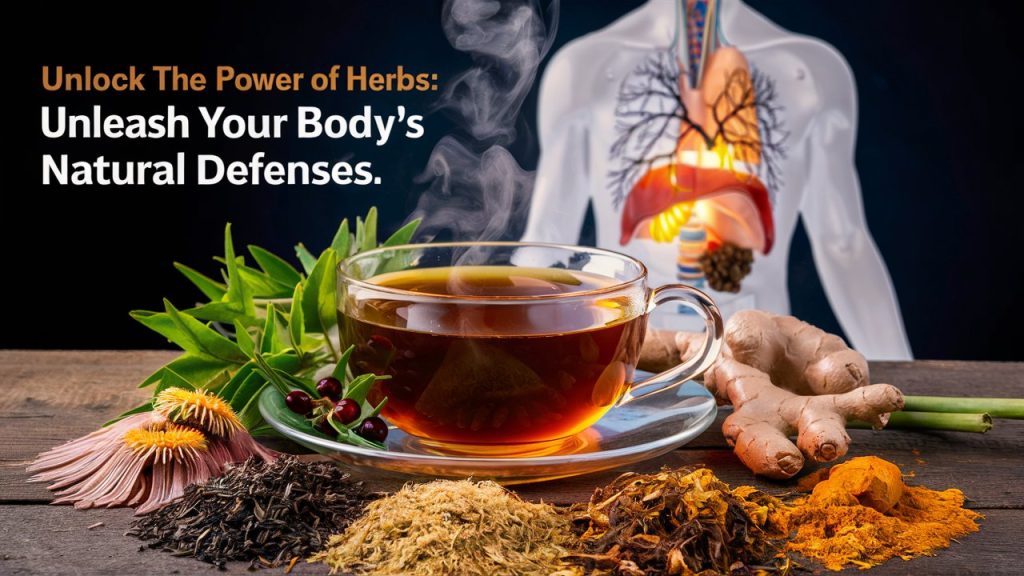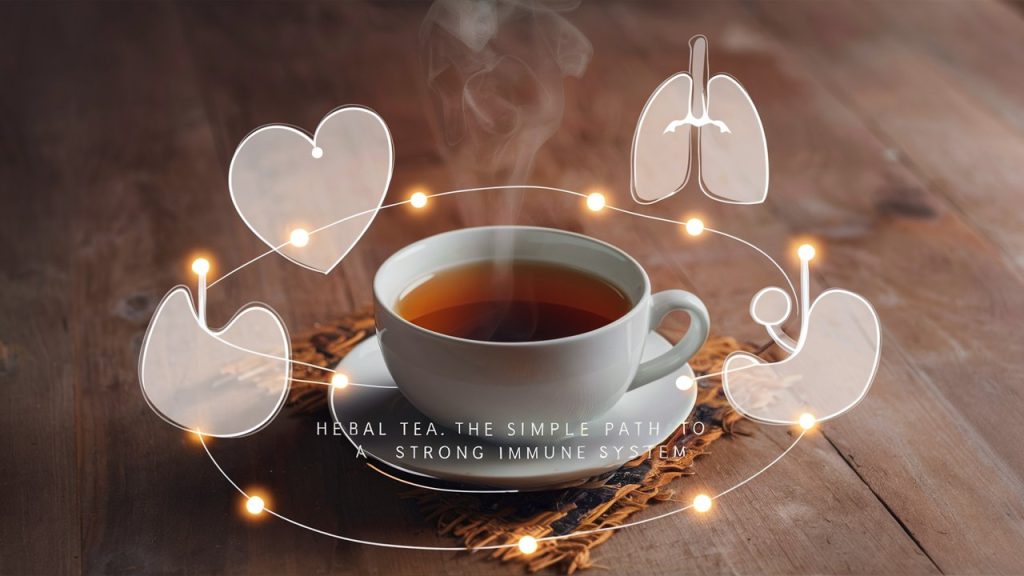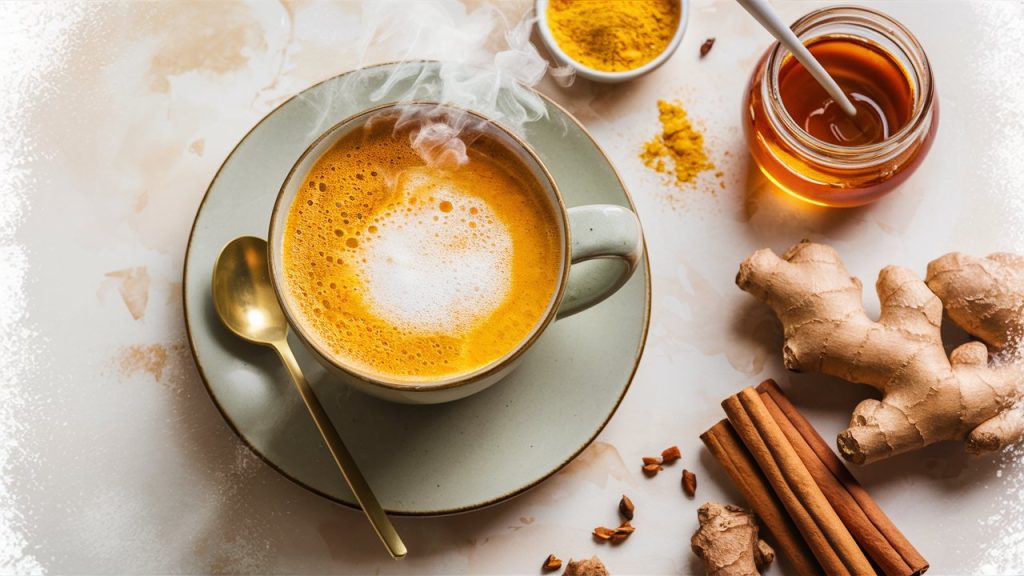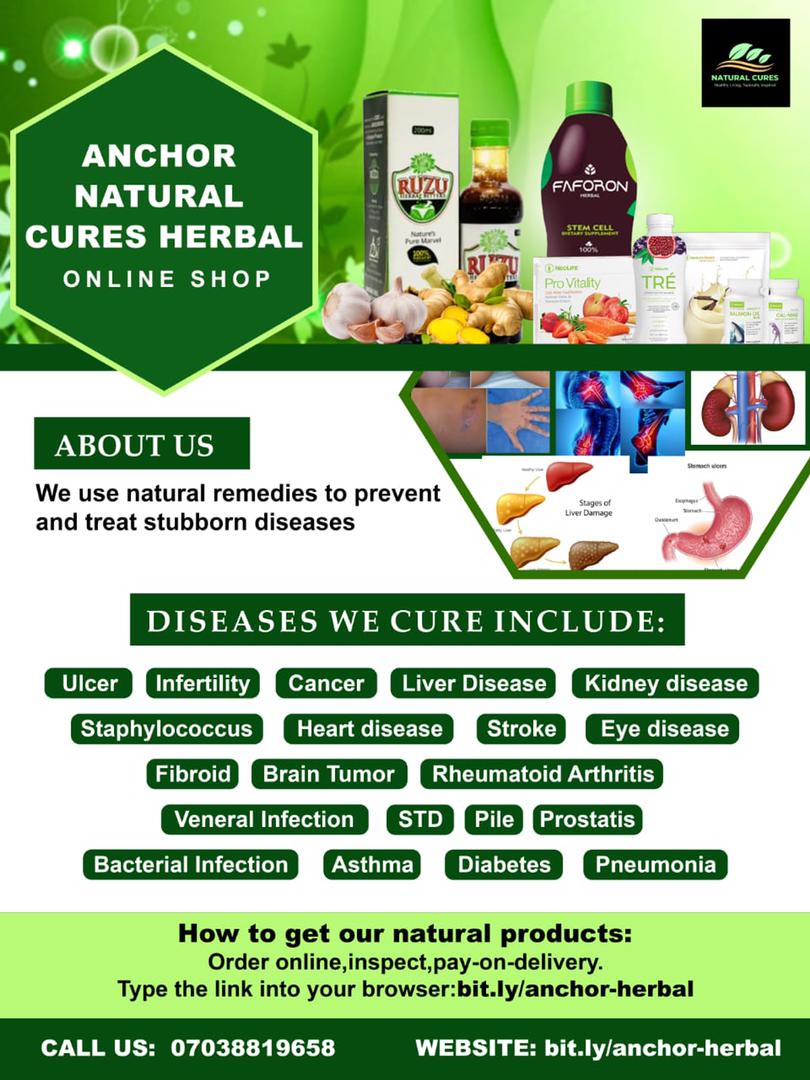Herbal tea for immune support: What is the best herb for your immune system?

Herbal Tea for Immune Support: Unveiling the Powerhouse Herbs for Optimal Wellness
In today’s fast-paced world, staying healthy is paramount. Our immune system, the body’s intricate defense network, plays a crucial role in safeguarding us from illness. Fortunately, nature offers an abundance of resources to support a robust immune system, and herbal teas are a delightful, time-tested approach.
This comprehensive guide delves into the fascinating world of herbal teas and their potential to bolster your immune defenses. We’ll embark on a journey to understand the complexities of the immune system, explore the scientific evidence behind the benefits of herbal teas, and unveil the powerhouse herbs that reign supreme in the realm of immune support.
Understanding Your Immune System: The Body’s Guardian Army
Before we delve into the world of herbal teas, let’s establish a solid foundation by understanding the magnificent immune system. Imagine a meticulously coordinated army constantly on patrol, guarding the body’s borders and combating invaders. This intricate network of cells, tissues, and organs plays a vital role in protecting us from:
- Bacteria: Single-celled organisms that can cause infections like pneumonia and strep throat.
- Viruses: Microscopic parasites that invade healthy cells and replicate, leading to illnesses like the common cold and influenza.
- Fungi: Mold and yeasts that can cause infections like athlete’s foot and ringworm.
- Parasites: Organisms that live on or inside another organism (host) and obtain nutrients from it, causing various health problems.
The immune system comprises several key players:
- White blood cells: These specialized cells are the foot soldiers of the immune system. They identify and destroy pathogens (disease-causing organisms) through various mechanisms, including engulfing and digesting them (phagocytosis) and releasing antibodies that neutralize them.
- Lymphatic system: This network of vessels and tissues transports white blood cells throughout the body, ensuring they can reach infection sites. Lymph nodes, located along the lymphatic vessels, act as filters, trapping and destroying pathogens.
- Spleen: This organ filters blood, removes old or damaged red blood cells, and stores white blood cells, ready to be deployed when needed.
- Thymus: Located in the chest, the thymus plays a vital role in the development of T-lymphocytes (T cells), a specific type of white blood cell crucial for immune response.
The immune system functions through two main lines of defense:
- Innate immunity: This is the body’s first line of defense, a non-specific response that acts as a barrier against any foreign invader. Examples include physical barriers like skin and mucous membranes, inflammatory responses, and the production of natural killer (NK) cells that attack infected or abnormal cells.
- Adaptive immunity: This is a more targeted and specialized response developed over time through exposure to pathogens or vaccinations. It involves the production of antibodies and the activation of specific T cells to combat specific invaders.
The Power of Herbal Teas for Immune Support: A Scientific Exploration
For centuries, various cultures around the world have embraced herbal teas for their diverse health benefits. Recent scientific research is now shedding light on the potential of specific herbs to support a healthy immune system. Here’s a closer look at the science behind the magic:
- Antioxidants: Many herbs boast a wealth of antioxidants, compounds that combat free radicals – harmful molecules that damage cells and contribute to inflammation. Reducing free radical damage can strengthen the immune system’s overall function.
- Anti-inflammatory properties: Inflammation is a natural immune response, but chronic inflammation can weaken the immune system. Certain herbs possess anti-inflammatory properties that can help regulate the inflammatory response and support immune health.
- Immune system modulation: Some herbs may act as immunomodulators, influencing the activity of the immune system. They may stimulate the production of white blood cells or enhance their function, thereby bolstering the body’s defenses.
It’s crucial to remember that herbal teas are not a magic bullet for preventing illness. However, incorporating them into a healthy lifestyle, alongside a balanced diet and adequate sleep, can contribute to a well-functioning immune system.
Unveiling the Powerhouse Herbs: A Deep Dive into Top Immune-Boosting Champions
Now that we’ve explored the science behind the benefits, let’s delve into the world of specific herbs that reign supreme in the realm of immune support. Here, we’ll go beyond the basic information often found in competitor articles, providing in-depth analysis, brewing instructions, and taste profiles:
1. Echinacea: The Warrior Herb
Echinacea, a flowering plant native to North America, has earned a reputation as a warrior herb for its potential to support the immune system. Studies suggest that Echinacea may stimulate the production of white blood cells and enhance their activity, potentially the duration of the common cold and reducing its severity.
Active Ingredients and Immune-Boosting Properties:
Echinacea boasts several active compounds, including:
- Cichoric acid: This compound exhibits anti-inflammatory and antiviral properties.
- Caffeic acid derivatives: These compounds may stimulate the immune system by increasing the production of immune cells.
- Alkamides: These compounds possess antibacterial and antifungal properties.
Potential Side Effects and Interactions:
Echinacea is generally safe for most healthy adults when taken for short periods (up to 4 weeks). However, some potential side effects include:
- Stomach upset
- Diarrhea
- Headache
- Skin rash (rare)
People with certain medical conditions or taking specific medications should consult a healthcare professional before using Echinacea. Here are some potential interactions:
- Autoimmune diseases: Echinacea may stimulate the immune system, which could be harmful for people with autoimmune diseases like lupus or rheumatoid arthritis.
- Medications that suppress the immune system: Echinacea may counteract the effects of these medications.
Brewing Instructions and Taste Profile:
Echinacea tea is readily available in pre-packaged tea bags or loose-leaf forms. Here’s how to brew a cup of Echinacea tea:
- Steep 1 teaspoon of dried Echinacea in a cup of hot water (not boiling) for 10-15 minutes.
- Strain the tea and enjoy.
Taste Profile: Echinacea tea has a slightly bitter and earthy taste. Honey or lemon can be added to enhance the flavor.
2. Elderberry: The Potent Berry
Elderberry, a flowering shrub native to Europe, Asia, and North Africa, has been used for centuries in traditional medicine. The dark purple berries are packed with nutrients and antioxidants that may support immune function [5].
Active Ingredients and Immune-Boosting Properties:
Elderberry contains a variety of beneficial compounds, including:
- Anthocyanins: These powerful antioxidants may help reduce inflammation and strengthen the immune system’s response to viruses.
- Flavonoids: These compounds possess antiviral and immune-modulating properties.
Potential Side Effects and Interactions:
Elderberry is generally safe for most healthy adults when consumed in ripe, cooked form. However, raw elderberries and their leaves can be toxic and should be avoided. Here are some additional points to consider:
- Pregnant or breastfeeding women: Consult a healthcare professional before consuming elderberry.
- Medications: Elderberry may interact with certain medications. Consult a healthcare professional before use.
Brewing Instructions and Taste Profile

Elderberry tea is typically not brewed from the berries themselves due to potential toxicity concerns. Instead, commercially available elderberry teas often combine elderberry with other immune-supporting herbs like hibiscus and ginger. Here’s how to brew a cup of elderberry tea (assuming a commercially prepared blend):
- Steep 1-2 teaspoons of loose-leaf tea in a cup of hot water (not boiling) for 5-10 minutes.
- Strain the tea and enjoy.
Taste Profile: Elderberry tea has a tart and slightly sweet flavor. Honey or lemon can be added to adjust the taste.
3. Astragalus: The Adaptogenic Ally
Astragalus, a flowering plant native to East Asia, is revered in Traditional Chinese Medicine (TCM) for its adaptogenic properties. Adaptogens are believed to help the body adapt to stress and support overall well-being. Astragalus may also play a role in immune function.
Active Ingredients and Immune-Boosting Properties:
Astragalus contains a variety of bioactive compounds, including:
- Astragalosides: These compounds may enhance immune function by stimulating the production of white blood cells and antibodies [9].
- Polysaccharides: These complex sugars may have immunomodulatory properties.
Potential Side Effects and Interactions:
Astragalus is generally safe for most healthy adults when taken for short periods. However, some potential side effects include:
- Stomach upset
- Diarrhea
- Headache
Pregnant or breastfeeding women and people with certain medical conditions should consult a healthcare professional before using Astragalus. Here are some potential interactions:
- Medications that suppress the immune system: Astragalus may counteract the effects of these medications.
- Medications that lower blood pressure: Astragalus may have a mild blood pressure-lowering effect, so caution is advised if taking medications for high blood pressure.
Brewing Instructions and Taste Profile:
Astragalus root is not typically consumed on its own due to its weak flavor. However, it is often included insharemore_vert
…herbal tea blends specifically formulated for immune support. Here’s what to consider when choosing an Astragalus-containing tea blend:
- Look for reputable brands that use high-quality, organic ingredients.
- Check the label for the percentage of Astragalus root in the blend.
- Consider the taste profile of the other herbs in the blend to ensure it aligns with your preferences.
Taste Profile: Astragalus root has a mild, slightly sweet flavor. The overall taste of the tea will depend on the other herbs included in the blend.
4. Ginger: The Spicy Soother
Ginger, a flowering plant with a knobby underground root, is a common culinary spice with a long history of medicinal use. Ginger boasts anti-inflammatory and immune-modulating properties that may contribute to a healthy immune system.
Active Ingredients and Immune-Boosting Properties
Ginger contains several beneficial compounds, including:
- Gingerol: This bioactive compound possesses anti-inflammatory and antioxidant properties.
- Shogaols: These compounds may also contribute to ginger’s anti-inflammatory effects.
Potential Side Effects and Interactions:
Ginger is generally safe for most healthy adults when consumed in moderate amounts. However, some potential side effects include:
- Heartburn
- Stomach upset
- Diarrhea (at high doses)
People with certain medical conditions or taking specific medications should consult a healthcare professional before using ginger. Here are some potential interactions:
- Blood thinners: Ginger may have blood-thinning properties, so caution is advised if taking blood-thinning medications.
- Medications for diabetes: Ginger may interact with medications for diabetes, potentially lowering blood sugar levels too much.
Brewing Instructions and Taste Profile:
Ginger tea can be easily brewed using fresh ginger root or pre-packaged ginger tea bags. Here’s how to brew a cup of ginger tea using fresh ginger:
- Peel a 1-inch piece of ginger root and slice it thinly.
- Steep the ginger slices in a cup of hot water (not boiling) for 5-10 minutes.
- Strain the tea and enjoy.
Taste Profile: Ginger tea has a spicy, slightly sweet flavor. Honey or lemon can be added to adjust the taste. Ginger tea can also be combined with other immune-supporting herbs like lemon or honey for a more complex flavor profile.
5. Turmeric: The Golden Guardian
Turmeric, a brightly colored rhizome (underground stem) native to Southeast Asia, has gained widespread popularity for its potential health benefits. Curcumin, the main active ingredient in turmeric, boasts anti-inflammatory and immune-modulating properties that may contribute to a healthy immune system.
Active Ingredients and Immune-Boosting Properties:
Turmeric’s health benefits are primarily attributed to curcumin, which possesses the following properties:
- Anti-inflammatory: Curcumin helps reduce inflammation, which can weaken the immune system.
- Immunomodulatory: Curcumin may help regulate the immune response and support overall immune function.
Potential Side Effects and Interactions:
Turmeric is generally safe for most healthy adults when consumed in moderate amounts. However, some potential side effects include:
- Stomach upset
- Diarrhea
- Heartburn
People with certain medical conditions or taking specific medications should consult a healthcare professional before using turmeric. Here are some potential interactions:
- Blood thinners: Turmeric may have blood-thinning properties, so caution is advised if taking blood-thinning medications.
- Diabetes medications: Turmeric may interact with medications for diabetes, potentially lowering blood sugar levels too much.
Brewing Instructions and Taste Profile:
Turmeric tea can be brewed using ground turmeric or turmeric root. Here’s how to brew a cup of turmeric tea using ground turmeric:
- Add 1/2 teaspoon of ground turmeric to a cup of hot water (not boiling).
- Add a squeeze of lemon juice and a pinch of black pepper to enhance curcumin absorption [17].
- Stir well and enjoy.
Taste Profile: Turmeric tea has a slightly bitter, earthy flavor. The addition of lemon juice and black pepper can help improve the taste. Turmeric tea can also be combined with other immune-supporting herbs like ginger or honey for a more palatable flavor profile.
6. Licorice Root: The Sweet Soother
Licorice root, root of the licorice plant, has been used for centuries in traditional medicine for its soothing and medicinal properties. While licorice boasts some potential benefits for the immune system, it’s important to approach it with caution due to potential side effects.
Active Ingredients and Immune-Boosting Properties:
Licorice root contains several bioactive compounds, including:
- Glycyrrhizin: This compound is responsible for licorice’s sweet taste and may possess some anti-inflammatory and antiviral properties [18].
Limited Evidence for Immune Support:
While some studies suggest licorice may enhance immune function by increasing white blood cell production, the evidence is limited and more research is needed [19].
Potential Side Effects and Interactions:
Licorice root can cause side effects, especially when consumed in high doses or for extended periods. These include:
- High blood pressure
- Low potassium levels
- Muscle weakness
- Headache
Pregnant or breastfeeding women, people with high blood pressure, heart disease, or kidney disease should avoid licorice root. Here are some potential interactions:
- Medications for high blood pressure: Licorice root can worsen high blood pressure.
- Diuretics: Licorice root can deplete potassium levels, which can be exacerbated by diuretics.
- Heart medications: Licorice root can interfere with the effectiveness of certain heart medications.
Limited Use in Immune-Supporting Tea Blends:
Due to the potential side effects, licorice root is not a prominent ingredient in most immune-supporting tea blends. However, some blends may contain small amounts for its flavoring properties.
Taste Profile: Licorice root has a very sweet and slightly anise-flavored taste. It’s important to note that due to the potential side effects, licorice root is not recommended for frequent consumption in immune-supporting teas.
Choosing the Right Herbal Tea for You

With a diverse range of immune-supporting herbs available, selecting the right one for you depends on your individual needs and preferences. Here are some factors to consider:
- Specific needs: Are you looking to address a particular concern like the common cold or seeking general immune support?
- Taste preferences: Do you enjoy spicy, earthy, or sweet flavors? Explore the taste profiles of different herbs to find one that aligns with your liking.
- Potential side effects: Review the potential side effects of each herb and choose one that is safe for you based on your health profile and medications.
DIY Herbal Tea Blends: Unleash Your Inner Tea Mixologist
Feeling adventurous? Craft your own personalized immune-supporting tea blends using the herbs discussed above! Here are some recipe variations to get you started:
Recipe 1: The Warrior Blend
- 1 teaspoon Echinacea
- ½ teaspoon Astragalus (in a blend)
- ½ teaspoon Ginger (freshly sliced or grated)
- ½ teaspoon Turmeric (freshly grated or ground)
- A pinch of black pepper (to enhance curcumin absorption)
Instructions:
- Steep the herbs in a cup of hot water (not boiling) for 10-15 minutes.
- Strain the tea and enjoy.
Taste Profile: This blend offers a combination of spicy (ginger), earthy (Astragalus, turmeric), and slightly bitter (Echinacea) flavors. Honey or lemon can be added to adjust the taste.
Recipe 2: The Soothing Soother Blend
- 1 teaspoon Elderberry (commercially prepared blend)
- ½ teaspoon Licorice root (use sparingly due to side effects)
- 1 teaspoon Peppermint leaves
- A squeeze of lemon juice
Instructions:
- Steep the herbs in a cup of hot water (not boiling) for 10-15 minutes.
- Strain the tea and enjoy.
Taste Profile: This blend offers a combination of sweet (elderberry, licorice), refreshing (peppermint), and tart (lemon) flavors.
Safety Considerations and Potential Side Effects
It’s crucial to remember that herbal teas are not a substitute for medical advice. If you have any underlying health conditions, consult your healthcare professional before consuming any herbal teas. Additionally, be mindful of potential side effects and interactions with medications.
Unveiling Your Path to Optimal Wellness
The journey towards optimal wellness is a lifelong pursuit. By incorporating immune-supporting herbal teas into a healthy lifestyle, you can empower your body’s natural defenses. Remember, these teas work best alongside a balanced diet, regular exercise, and adequate sleep. Explore the world of herbs, discover the flavors that tantalize your taste buds, and embark on a path to holistic well-being.
Ready to explore the world of immune-supporting herbal teas? Browse our extensive selection of quality, organic herbal tea blends designed to empower your immune system. We offer a variety of blends to cater to different taste preferences and specific needs. Whether you’re seeking a spicy warrior blend or a soothing soother option, we have the perfect cup waiting for you.



















